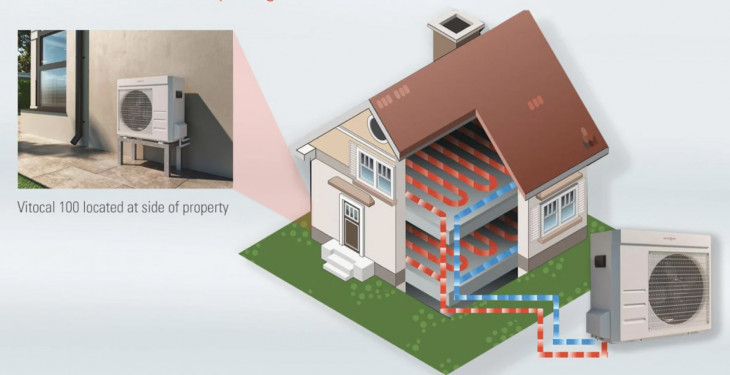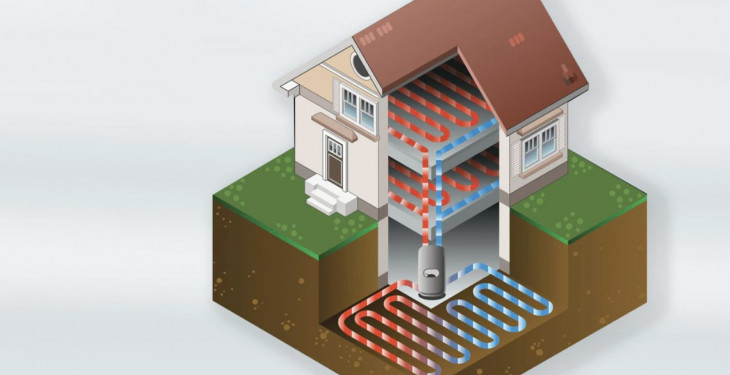

Written by Stephen Day
Gas Safe Engineer
Updated: 5th January, 2026
As one of the hottest topics in the industry, heat pumps are being contemplated by homeowners for their ability to bring about savings, however, is all as it seems?
Get a new boiler quote, save up to £550 per year (0% APR available).
What are heat pumps' advantages and do they outweigh their disadvantages as a home heating system?
Allow iHeat to investigate…
A heat pump transfers captured heat from the air outside to the inside of a property, this is then used to fuel the property’s central or underfloor heating (in some cases provide hot running water also).
Heat energy is present everywhere, including outside, heat flows naturally from a warmer place to a colder place, to heat a home however, heat energy would need to do the opposite, flow from a colder to a warmer place. Here’s how it happens -
As the pressure of a gas increases, so does its temperature, and in turn the temperature decreases with a drop in pressure.
The gas used in the heat pump process is called a refrigerant, and is compressed by electricity to raise the pressure and temperature, as the refrigerant's heat is transferred to a property via the heat exchanger, it cools down a tad.
The refrigerant then expands so it cools further, the resultant low temperature gas is now cold enough to absorb more heat from outside and begin the process again.
The heat that has been deposited in the heat exchanger in the process mentioned above would traditionally occur via a central heating system.
An air source heat pump’s refrigerant comes from outside the unit (evaporator) and absorbs heat energy blown across a heat exchanger using fans.

Ground Source heat pumps work by sourcing heat from water in underground pipes (either long or coiled in trenches), which is then pumped to a heat exchanger.
The cool water is mixed with antifreeze and passes through the heat exchanger, transferring the heat to the refrigerant, which continues to flow around the compressor circuit.

The main reason why heat pumps of either type are so widely spoken about currently, is their propensity for potential savings, especially considering the current exponentially high energy bills causing the dismay of the UK public.
Heat pumps are extremely efficient in the production of heat energy, meaning a reduction in heating bills, saving prospective buyers what could turn out to be a significant amount of money each year.
Anything that should be checked annually on a heat pump set up can be done by the owner, anything that requires professional attention from a Gas Safe engineer should be checked every 3-5 years.
The efficiency of a heat pump’s conversion rate and the fact it does not burn a fuel to operate, lowers a household's carbon emissions. This not only helps the planet, but also increases the safety of the home’s occupants.
On average the lifespan of a heat pump installation is around 15 years, some can however last up to 50 years, providing maximum efficiency and robust reliability.
When it’s hot outside, many heat pumps are actually capable of reversing their operational process to act like an air conditioning unit.
The government introduced the boiler upgrade scheme, this £450 million initiative comes as part of the Heat and Buildings Strategy that offers a £6,000 reduction of the supply and installation of a ground source (£5000 for air source) heat pump for property owners in England and Wales.
Heat pumps demand a very high initial purchase price with some units costing upwards of £45,000! This can negate the idea of savings offered by installing a heat pump for many people, as not too many homeowners have a spare forty grand lying around.
Lot’s of initial and potentially delaying assessment must be made on an installation site before work can begin, including as going as specific as local geology assessments.
Some heat pump installations actually require planning permission in Scotland, Northern Ireland and Wales, whereas in England it can be dependent on the size and location of the property.
Some heat pumps experience issues in functionality in cold locations, meaning their reported efficiency will be compromised.
Despite being reliant upon electricity to function, heat pumps are not totally carbon neutral, this is because the process of generating electricity actually can be quite a carbon intensive task.
Some properties don’t have sufficient insulation to be an ideal heat pump location. Without considerable insulation, the heat generated from a pump would be lost. Loft and cavity wall insulation can bump up the cost of a heat pump installation considerably.
Heat pumps run on electricity, and while this is efficient and releases less emissions, electricity is the most expensive type of fuel on the market and can cost up to three times the price of gas (one of the most affordable fuel types).
While there is no doubt, in the right environment, heat pumps can be a fantastic addition to any home, it is the potential negatives of utilising such systems that may be the deciding factor for many homeowners.
Primary concern would be directed at the very costly unit price of most heat pumps, even with the idea of energy saving, the unit price would be enough to put many would be buyers off.
At iHeat we stock a massive range of sleek new combi and system boilers, designed to save space and perform at the highest level. With sizes to fit any property, now might be the perfect time to replace an old boiler and upgrade to an efficient combi or powerful system.
Last updated: 5th January, 2026

Written by Stephen Day
Gas Safe Engineer at iHeat
Stephen Day is a Gas Safe registered and FGAS certified engineer with over 20 years of hands-on experience in the heating, cooling, and renewable energy industry, specialising in boiler installations, air conditioning, and heat pump systems.
LinkedInArticles by Stephen Day are reviewed by iHeat’s technical team to ensure accuracy and reliability.

27th February, 2026
Condensing boilers are considered to be some of the most efficient boilers out there on th...
 Read Article
Read Article

26th February, 2026
Vaillant boilers use a variety of parts to ensure efficient operation. This section looks...
 Read Article
Read Article

26th February, 2026
Leaving the heating on low all day might seem like a way to avoid the chill without bursti...
 Read Article
Read Article
No obligation. Takes less than 60 seconds.